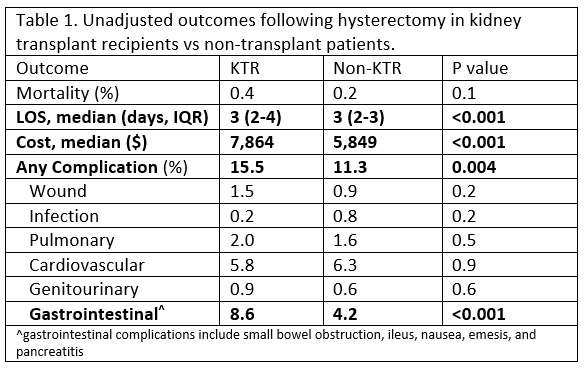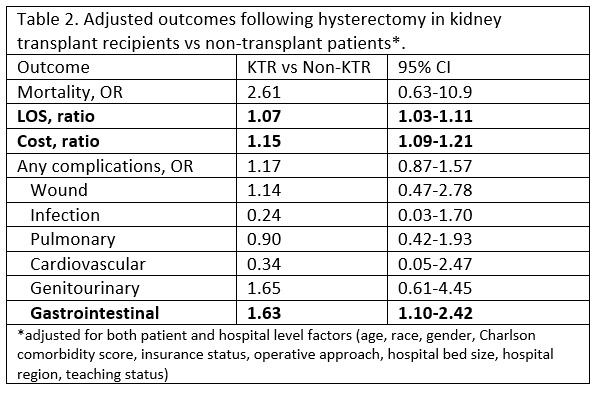Outcomes Following Hysterectomy in Kidney Transplant Recipients.
Surgery, JHU, Baltimore
Meeting: 2017 American Transplant Congress
Abstract number: 127
Keywords: Kidney, Outcome, Surgical complications
Session Information
Session Name: Concurrent Session: Kidney Clinical Complications 1
Session Type: Concurrent Session
Date: Sunday, April 30, 2017
Session Time: 4:30pm-6:00pm
 Presentation Time: 5:06pm-5:18pm
Presentation Time: 5:06pm-5:18pm
Location: E354a
Nearly 1/3 of American women, including kidney transplant recipients (KTR), undergo hysterectomy in their lifetime, making it one of the most common female-specific surgeries performed. Given the need for immunosuppression and the physiologic impact of years of renal replacement, we hypothesized that hysterectomy might have higher risks for KTR. We investigated the differences in morbidity, LOS, and cost between KTR and non-KTR undergoing hysterectomy at both transplant and non-transplant centers nationwide.
METHODS: The National Inpatient Sample was used to study 2160 adult KTR and 4.5 million non-KTR who underwent hysterectomy between 2000-11. Morbidity, defined as postoperative complications, was identified by ICD9 code. Complication rates, LOS, and cost were compared using hierarchical logistic regression, negative binomial regression and mixed effects log-linear models respectively.
RESULTS: The mortality (0.4 vs 0.2%, aOR 2.61, p=0.1) and morbidity (aOR 1.17 95%CI 0.87-1.57) for KTR and non-KTR were not statistically significantly different (Table 1,2). KTR had significantly more gastrointestinal complications (8.6 vs 4.2% p <0.001, aOR 1.63 95%CI 1.10-2.42). LOS was longer (adjusted ratio 1.07, 95%CI 1.03-1.11) and hospital costs were higher ($7864 vs $5849 p<0.001, adjusted ratio 1.15 95%CI 1.09-1.21) for KTR compared to non-KTR. These findings were similar at both transplant center and non-transplant centers.
CONCLUSION: KTR have similar rates of mortality and overall morbidity, but have longer LOS and higher costs than non-KTR undergoing hysterectomy, as well as a higher rate of gastrointestinal complications. Undergoing surgery at a transplant center does not impact these findings. Physicians should anticipate these issues and streamline perioperative care to minimize unnecessary resource use in these cases. 

CITATION INFORMATION: DiBrito S, Olorundare I, Haugen C, Holscher C, Kucirka L, Segev D, Garonzik-Wang J. Outcomes Following Hysterectomy in Kidney Transplant Recipients. Am J Transplant. 2017;17 (suppl 3).
To cite this abstract in AMA style:
DiBrito S, Olorundare I, Haugen C, Holscher C, Kucirka L, Segev D, Garonzik-Wang J. Outcomes Following Hysterectomy in Kidney Transplant Recipients. [abstract]. Am J Transplant. 2017; 17 (suppl 3). https://atcmeetingabstracts.com/abstract/outcomes-following-hysterectomy-in-kidney-transplant-recipients/. Accessed February 11, 2026.« Back to 2017 American Transplant Congress
